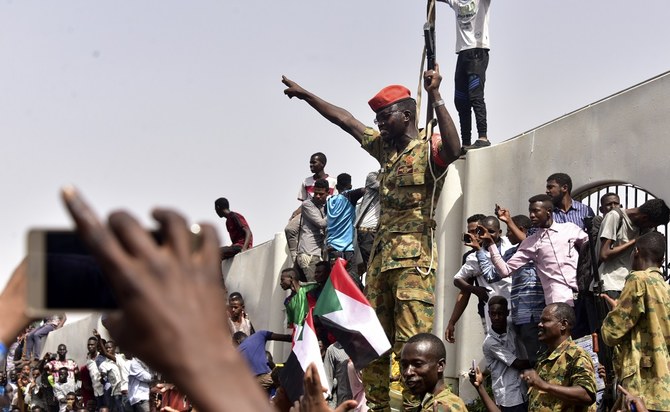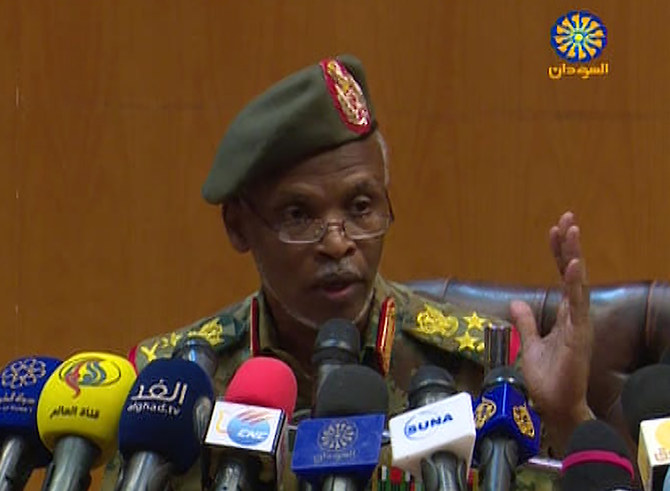KHARTOUM: A Sudanese army official said on Friday that the military authorities will not extradite deposed President Omar Al-Bashir but will try him at home, before the nation.
Col. Gen. Omar Zein Abedeen made the remarks at a press conference in the capital, Khartoum, defending the military's removal of Bashir from power.
He says the ouster "was not a coup" but a response to the people's demands.
He said that handing over Bashir would be "an ugly mark on Sudan ... even rebels carrying weapons, we won't extradite them."
Bashir is wanted by the International Criminal Court, where he faces charges of war crimes, crimes against humanity and genocide for his deadly campaign against insurgents in Darfur.
The Sudanese army claims it has no ambition to hold the reins of power for long after Bashir, saying it responded to calls from the people against his rule.
Zein Abedeen said that the military wants to "guide the country forward" and act as a "tool for change."
Zein Abedeen, a member of the transitional council that took over on Thursday after Bashir was arrested, tried to strike a conciliatory tone, saying: "We came for you."
He says Bashir is in custody but declined to provide more details. He said Bashir's top government members, including the vice president and associates, are also under arrest but didn't elaborate.
He pledged the military would stay only as long as it's needed.
Sudan's UN envoy said Friday that a two-year transition period to civilian rule announced by the military council that seized power in the country could be shortened as protesters kept up their demands for change.
Addressing the UN Security Council, Sudan's charge d'affaires Yasir Abdelsalam offered assurances that the military council would support an inclusive civilian-led government.
"The (military) council will be the guarantor of a civilian government to be formed in collaboration with political forces and stakeholders. No party will be excluded," said Abdelsalam.
"The transitional period could be shortened depending on developments on the ground and agreements between stakeholders," he told the Security Council.
Hundreds of thousands of demonstrators thronged the streets surrounding Sudan's defence ministry compound in the capital Khartoum on Friday, a Reuters witness said.
Protesters have voiced anger at the ruling transitional military council, which announced a transition period of up to two years after the military deposed Omar Al-Bashir as president on Thursday.
Sudan’s main protest organizing group on Friday rejected the transitional military council promise to set up a civilian government and hand over power to an elected president within two years.
“Our demands are clear, just and legitimate, but the coupists (the regime’s security committee)... are not capable of creating change, and they do not have the safety and stability to stay in power,” the Sudanese Professionals Association said in a statement.
“This is not to mention the peaceful demands of handing over power to a transitional civilian government as one of the conditions that needs to be implemented.”
The pro-democracy protesters who spent four months on the streets rallying against the country's autocratic president earlier defied military orders of a curfew after the arrest of Bashir.
Thousands kept up their sit-in outside the military headquarters in Khartoum overnight and into Friday morning.
Organizers of the demonstration say they'll keep up the campaign. It wasn't clear if the army would move against the protesters.
The mood in the crowd appeared festive, with protesters playing music and chanting, "Down again" — a reference Defense Minister Awad Mohammed Ibn Ouf.
Ouf, on a US sanctions list for Darfur genocide, was sworn in as head of the new military transitional council that has taken charge for the next two years.
Meanwhile, the Arab League said that it is following developments with regards to Sudan’s political transition and will continue to work with the country to achieve peace and stability in it.



























